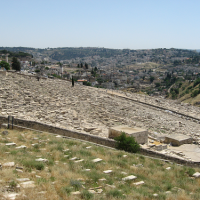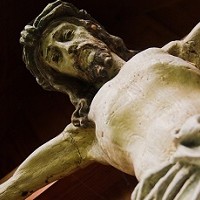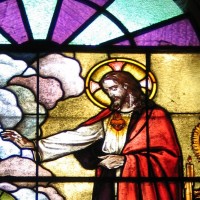 A King Who Understands the Valley
A King Who Understands the Valley
by Barbara Shafer, Seminary Gal
Palm Sunday represents a unique challenge to a Sunday morning hospital ministry. Tempting as it may be to stay cheerful and go from the mountaintop of Palm Sunday’s Triumphal Entry to the mountaintop of Easter Sunday’s Resurrection, doing so by-passes the valley. Sunday-to-Sunday bypasses the Cross. It bypasses the tomb of Jesus before He was resurrected. And it strips the Gospel of its power to minister to us in our deepest needs.
I submit to you that we cannot have just a king of the mountaintops who says he feels our pain. We need a King who lived it.
We need a King who understands the valley.
Any king that has only experienced mountaintops cannot minister to us in the valleys of life. Chances are good that unless you’re happily in the maternity ward, you’re probably feeling like you’re in a valley right now.
Today’s encouragement is that Jesus is a King who understands the valley.
In our sermon series on the Gospel according to Matthew, we’ve reached Holy Week, also called Passion Week—the week beginning with Palm Sunday and concluding with Easter Sunday. So today we will see our King descend from the Mount of Olives into the valley of suffering—into the valley of the shadow of death.
The people didn’t know. They celebrated because they thought he was heading to a coronation as their long-awaited King at the Temple Mount. From the Mount of Olives to Jerusalem and Mount Zion, but Jesus wasn’t going from mountaintop to mountaintop without knowing the valley.
 If you’ve ever been to Jerusalem you know that there is huge Jewish cemetery on the western slope of the Mount of Olives, facing Jerusalem. That cemetery is the traditional burial place of many notable Jews dating back to King David’s son Absalom and the prophet Zechariah. Today there are more than 150,000 Jews buried there anticipating the Messiah and the grand resurrection to come.
If you’ve ever been to Jerusalem you know that there is huge Jewish cemetery on the western slope of the Mount of Olives, facing Jerusalem. That cemetery is the traditional burial place of many notable Jews dating back to King David’s son Absalom and the prophet Zechariah. Today there are more than 150,000 Jews buried there anticipating the Messiah and the grand resurrection to come.
Jesus went from the mountaintop of the Mount of Olives, past the tombs and crossed the Kidron Valley before entering Jerusalem. What were the Jews of His day expecting? Why the celebration? They thought they were seeing Scripture finally fulfilled in the Messiah:
- Joel 2:32 And everyone who calls on the name of the LORD will be saved; for on Mount Zion and in Jerusalem there will be deliverance, as the LORD has said, among the survivors whom the LORD calls.
- Obadiah 1:17 But on Mount Zion will be deliverance; it will be holy, and the house of Jacob will possess its inheritance.
- Zechariah 14:4 On that day his feet will stand on the Mount of Olives, east of Jerusalem, and the Mount of Olives will be split in two from east to west, forming a great valley, with half of the mountain moving north and half moving south.
- Zechariah 9:9 Rejoice greatly, O Daughter of Zion! Shout, Daughter of Jerusalem! See, your king comes to you, righteous and having salvation, gentle and riding on a donkey, on a colt, the foal of a donkey. 10 I will take away the chariots from Ephraim and the war-horses from Jerusalem, and the battle bow will be broken. He will proclaim peace to the nations. His rule will extend from sea to sea and from the River to the ends of the earth. 11 As for you, because of the blood of my covenant with you, I will free your prisoners from the waterless pit. 12 Return to your fortress, O prisoners of hope; even now I announce that I will restore twice as much to you. 13 I will bend Judah as I bend my bow and fill it with Ephraim. I will rouse your sons, O Zion, against your sons, O Greece, and make you like a warrior’s sword. 14 Then the LORD will appear over them; his arrow will flash like lightning. The Sovereign LORD will sound the trumpet; he will march in the storms of the south, 15 and the LORD Almighty will shield them. They will destroy and overcome with slingstones. They will drink and roar as with wine; they will be full like a bowl used for sprinkling the corners of the altar. 16 The LORD their God will save them on that day as the flock of his people. They will sparkle in his land like jewels in a crown.
The mountaintop of the Lord’s coming is a day of rejoicing, preceded by battle in a great valley the Lord knows. Their victory awaits. It is why they shout Hosanna! It’s praise and salvation all wrapped up in one! But Jesus doesn’t go to the Temple for a coronation.
Instead His Passion week unfolds with crossing the valley of human suffering:
- He heads to the temple but not for the reason they thought. He was cleansing the temple to point out that the valley must be a place of purification.
- He cursed the fig tree and it withered, pointing out that the valley must be a place of authenticity, truth and faith.
- His authority is questioned, but Jesus points out that the valley must be a place where God’s authority is shown and accepted.
- The valley is a place of holiness—and as holy, it requires repentance and atonement for sin
- The valley is a place to encounter God (for us through His Son and Suffering Servant, Jesus Christ)
- The valley is a place to respond to the greatest commandment to love the Lord and to love those who bear His image—the Cross being the supreme example of this!
 The Jews of Jesus’ day did not understand that Jesus is not a political king who goes from mountaintop to mountaintop, ruling over a nation without dealing with the spiritual valley as the Suffering Servant.
The Jews of Jesus’ day did not understand that Jesus is not a political king who goes from mountaintop to mountaintop, ruling over a nation without dealing with the spiritual valley as the Suffering Servant.
* * *
But Jesus is a King who understands the valley.
In dealing with the valley as a place of battle, a place of purification, a place of truth and faith, a place of God’s authority over the events of this world, a place of atonement for sin and a place to show God’s greatest love…dealing with the valley meant this King…
The King who understands the valley of humanity’s condition…endures the Cross.
Followers of Jesus, too, must deal with the valley…but not through a crucifixion we have to endure. Rather,
- We deal with the valley by coming to the King who endured the Cross for us.
- We deal with the valley in the battles of life and in Jesus, finding purification and truth and love.
- We deal with the valley by saying “No” to the things of sin and saying “Yes and Amen” to Christ our King!
- We deal with the valley by worshiping the One who gave His only Son, Jesus Christ so that we do not have to bear the consequences of our sins or dwell in the valley of the shadow of death forever.
What happened during Passion Week? Why did the crowds turn on Him? Jesus was not conforming to the image of a mountaintop king the crowds expected. He first had to deal with our valley of sin and death. The Jews of His day didn’t understand that. Jerusalem didn’t recognize their king when He came the first time and Jesus wept over Jerusalem because of it (Luke 19:41-44).
 You see, someday, our King will return…not to deal with the valley again, but looking exactly like the Messiah the Jews of His day expected. A King to reign over the mountaintop as King of Kings and Lord of Lords.
You see, someday, our King will return…not to deal with the valley again, but looking exactly like the Messiah the Jews of His day expected. A King to reign over the mountaintop as King of Kings and Lord of Lords.
Jesus did not need to prove He was King. He knew who He was. He understood the valley, and endured the valley, but He would not remain in it.
Jesus said, “But I say to all of you: In the future you will see the Son of Man sitting at the right hand of the Mighty One and coming on the clouds of heaven” (Matthew 26:64).
Just prior to His crucifixion, when Pilate asked Jesus, “Are you the king of the Jews?” Jesus replied, “Yes, it is as you say.” He knew He was King.
But this King of Kings would not go from mountaintop to mountaintop without knowing the valley. He is both Priest and King and as such He is able to save. The Letter to the Hebrews states it this way. Hebrews 7:23 Now there have been many of those priests, since death prevented them from continuing in office; 24 but because Jesus lives forever, he has a permanent priesthood. 25 Therefore he is able to save completely those who come to God through him, because he always lives to intercede for them. 26 Such a high priest meets our need– one who is holy, blameless, pure, set apart from sinners, exalted above the heavens. 27 Unlike the other high priests, he does not need to offer sacrifices day after day, first for his own sins, and then for the sins of the people. He sacrificed for their sins once for all when he offered himself.
Jesus did this when He died on the Cross. We have a King who understands the valley!
No matter where today finds you: broken, convicted in your heart of sin, lonely, depressed, or hurting. No matter what today’s valley brings: sadness, grief, pain, fear of death, needing an encouraging word, or a hand of friendship and love. Jesus is the King who understands the valley you’re in. Come to Him. Find forgiveness in Him. Find love and friendship in Him. Find rest for your soul in Him. Find peace with God in Him. He dealt with the ultimate valley so you don’t have to do it alone. Come to Him. Though we are in the valley, through Him we can have hope of the mountaintop in the future. Philippians 2 states this about Jesus’ knowing our valley and His ultimate mountaintop coronation: Jesus,
Philippians 2:6 Who, being in very nature God, did not consider equality with God something to be grasped, 7 but made himself nothing, taking the very nature of a servant, being made in human likeness. 8 And being found in appearance as a man, he humbled himself and became obedient to death– even death on a cross! 9 Therefore God exalted him to the highest place and gave him the name that is above every name, 10 that at the name of Jesus every knee should bow, in heaven and on earth and under the earth, 11 and every tongue confess that Jesus Christ is Lord, to the glory of God the Father.
Amen!

 The cheese stands alone, the Christian does not.
The cheese stands alone, the Christian does not. A King Who Understands the Valley
A King Who Understands the Valley If you’ve ever been to Jerusalem you know that there is huge Jewish cemetery on the western slope of the Mount of Olives, facing Jerusalem. That cemetery is the traditional burial place of many notable Jews dating back to King David’s son Absalom and the prophet Zechariah. Today there are more than 150,000 Jews buried there anticipating the Messiah and the grand resurrection to come.
If you’ve ever been to Jerusalem you know that there is huge Jewish cemetery on the western slope of the Mount of Olives, facing Jerusalem. That cemetery is the traditional burial place of many notable Jews dating back to King David’s son Absalom and the prophet Zechariah. Today there are more than 150,000 Jews buried there anticipating the Messiah and the grand resurrection to come. The Jews of Jesus’ day did not understand that Jesus is not a political king who goes from mountaintop to mountaintop, ruling over a nation without dealing with the spiritual valley as the Suffering Servant.
The Jews of Jesus’ day did not understand that Jesus is not a political king who goes from mountaintop to mountaintop, ruling over a nation without dealing with the spiritual valley as the Suffering Servant. You see, someday, our King will return…not to deal with the valley again, but looking exactly like the Messiah the Jews of His day expected. A King to reign over the mountaintop as King of Kings and Lord of Lords.
You see, someday, our King will return…not to deal with the valley again, but looking exactly like the Messiah the Jews of His day expected. A King to reign over the mountaintop as King of Kings and Lord of Lords. When God calls the Church to be biblically countercultural, He doesn’t overlook that we are individuals.
When God calls the Church to be biblically countercultural, He doesn’t overlook that we are individuals. 
 The Gospel:
The Gospel:

 In our passage today,
In our passage today,